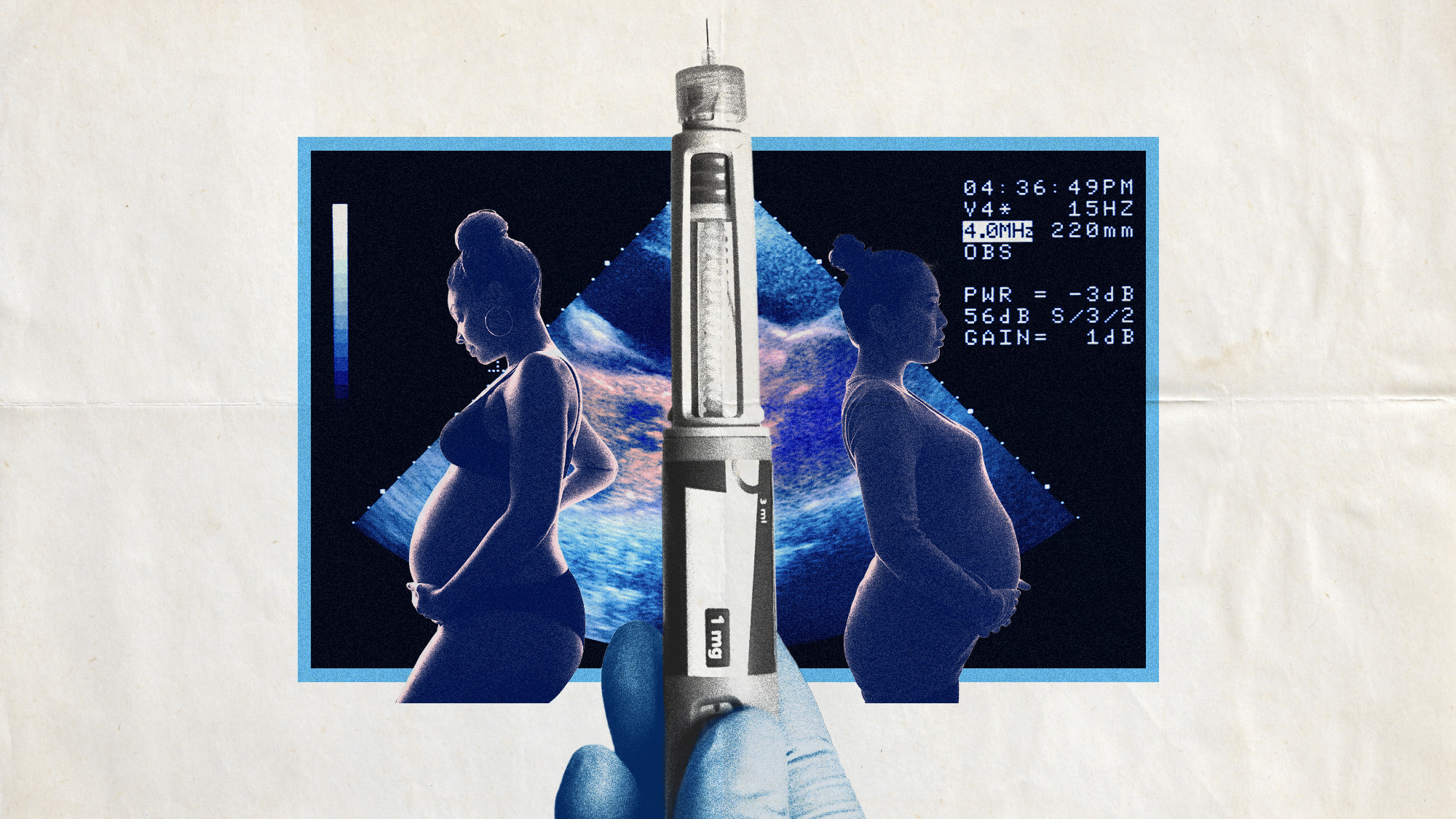Ozempic babies: a surprise side effect of weight loss drugs
Murmurs of unexpected pregnancies while taking semaglutide-based drugs are growing on social media


A free daily email with the biggest news stories of the day – and the best features from TheWeek.com
You are now subscribed
Your newsletter sign-up was successful
Women taking Ozempic or similar drugs for diabetes or weight loss are taking to social media to commiserate about an unexpected side effect — "surprise pregnancies," said The Washington Post. There is a Facebook group called "I got pregnant on Ozempic" with over 600 members, plus numerous Reddit and TikTok posts talking about the phenomenon. The new trend of so-called Ozempic babies has given some doctors hope for possible infertility treatment. Still, others are wary of moving forward with so little data on its safety.
An unexpected trend in Ozempic users
Reports of an Ozempic baby boom are mainly anecdotal at this point, and it's "not known how widespread the phenomenon is," said the Post. While doctors have speculated about the effects of significant weight loss on fertility and the possibility of GLP-1 drugs interfering with the absorption of oral contraceptives, there isn't any concrete evidence that pregnancy is a side effect of the drug. In fact, little is known about the impact of Ozempic and similar drugs on those who are trying to get pregnant because those people "were specifically excluded from early clinical trials of the drug," said the Post.
Novo Nordisk, the company behind Ozempic and Wegovy, said it was collecting data to evaluate if becoming pregnant was likely while using the latter. However, pregnancy or intending to become pregnant were both "exclusion criteria in our trials with semaglutide in both obesity and type 2 diabetes," the company said in a statement.
The Week
Escape your echo chamber. Get the facts behind the news, plus analysis from multiple perspectives.

Sign up for The Week's Free Newsletters
From our morning news briefing to a weekly Good News Newsletter, get the best of The Week delivered directly to your inbox.
From our morning news briefing to a weekly Good News Newsletter, get the best of The Week delivered directly to your inbox.
It remains unclear whether taking a GLP-1 puts you at higher risk of unplanned pregnancies, but doctors say there may be a few reasons why some women are getting pregnant while using the drug. Lora Shahine, a reproductive endocrinologist with a fertility practice in Washington, told the Post that weight loss can affect ovulation and fertility. Losing weight, along with "balancing of hormones and improved insulin resistance," causes the hormonal access to click back in, and "all of a sudden, they start ovulating again," said Shahine. The drugs could also interfere with how the body absorbs oral contraceptives. GLP-1 drugs help people lose weight by curbing their appetite and slowing gastric emptying, which may also affect the absorption of other medicines. "This may mean that birth control medications are metabolized or ineffective," William Dietz, a physician and chair of the STOP Obesity Alliance at the Milken Institute School of Public Health at George Washington University, said to the Post.
A debate over using semaglutide to treat infertility
The Ozempic baby boom has encouraged some doctors to use GLP-1 drugs as an off-label treatment for polycystic ovary syndrome, "one of the leading causes of infertility in U.S. women," Bloomberg said. "Yet they're doing so without much data on the drugs' impact on pregnancy." There are no drugs approved for treating PCOS, and experts cannot agree on whether diet programs that are typically recommended actually work. The lack of treatment options leaves some doctors and patients willing to try anything, and when it comes to GLP-1's, the "successes are tantalizing."
The problem is that companies have not studied the drug's use for PCOS and "don't plan to anytime soon," Bloomberg said. Without that data, researchers are doing their own studies on the drug's safety and efficacy as a PCOS treatment. A recent study based on the health records of 50,000 women with type 2 diabetes did not find an increase in congenital disabilities in the infants of those taking semaglutide during early pregnancy compared with those who took insulin. Still, the authors said additional research is needed, particularly in women without diabetes.
"The 'oops' babies on Ozempic and Wegovy are happening all over the place," Melanie Cree, the director of the PCOS clinic at Children's Hospital Colorado in Aurora, said to Bloomberg. And while it's "very exciting," the trend is "a bit scary because we're moving forward without all the data."
A free daily email with the biggest news stories of the day – and the best features from TheWeek.com
Doctors have a reason to worry, as experts still disagree on whether semaglutide is healthy for pregnant people or people planning to try to get pregnant. In studies, pregnant rats, rabbits and monkeys given semaglutide experienced increased congenital disabilities, according to the drug labels on Ozempic and Wegovy.
Theara Coleman has worked as a staff writer at The Week since September 2022. She frequently writes about technology, education, literature and general news. She was previously a contributing writer and assistant editor at Honeysuckle Magazine, where she covered racial politics and cannabis industry news.
-
 ‘Zero trimester’ influencers believe a healthy pregnancy is a choice
‘Zero trimester’ influencers believe a healthy pregnancy is a choiceThe Explainer Is prepping during the preconception period the answer for hopeful couples?
-
 Scientists are worried about amoebas
Scientists are worried about amoebasUnder the radar Small and very mighty
-
 Metal-based compounds may be the future of antibiotics
Metal-based compounds may be the future of antibioticsUnder the radar Robots can help develop them
-
 A Nipah virus outbreak in India has brought back Covid-era surveillance
A Nipah virus outbreak in India has brought back Covid-era surveillanceUnder the radar The disease can spread through animals and humans
-
 Deaths of children under 5 have gone up for the first time this century
Deaths of children under 5 have gone up for the first time this centuryUnder the radar Poor funding is the culprit
-
 A fentanyl vaccine may be on the horizon
A fentanyl vaccine may be on the horizonUnder the radar Taking a serious jab at the opioid epidemic
-
 Stopping GLP-1s raises complicated questions for pregnancy
Stopping GLP-1s raises complicated questions for pregnancyThe Explainer Stopping the medication could be risky during pregnancy, but there is more to the story to be uncovered
-
 Choline: the ‘under-appreciated’ nutrient
Choline: the ‘under-appreciated’ nutrientThe Explainer Studies link choline levels to accelerated ageing, anxiety, memory function and more



